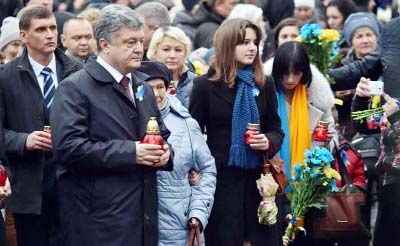
AFP, Palanga :
Several Eastern European countries are becoming increasingly worried that the West may abandon Ukraine in return for Russian backing in Syria, as Paris, Moscow and Washington develop closer ties in the fight against the Islamic State jihadist group.
The three Baltic states, which were under Moscow’s thumb until 1991, were particularly spooked by Russia’s annexation of Crimea from Ukraine last year and are concerned about the Kremlin’s territorial ambitions.
Together with Poland, the Baltic trio — Estonia, Latvia and Lithuania are proponents of exercising the utmost firmness regarding the Kremlin. They also fear that the conflicts in Syria and Ukraine will be lumped together.
“These are different crises and we must not link them, we must assess them separately,” Lithuanian Foreign Minister Linas Linkevicius told AFP.
“It is unacceptable to talk about some kind of trade, concessions or spheres of influence.”
French President Francois Hollande called this week for a broad anti-IS coalition in the aftermath of the Paris terror attacks, which killed 130 people and were claimed by IS.
On Thursday, Russia said it would be ready to work with such a coalition on the condition that its members respect Syria’s sovereignty a prospect that does not please the Baltics.
“Lithuania will not take part in any new coalition in which Russia will participate or would like to participate,” President Dalia Grybauskaite said Friday.
“To this day Russia is occupying the territory of one country and committing acts of war in two countries, Ukraine and Georgia,” she added in the western resort town of Palanga after meeting with her Baltic counterparts.
The Latvian foreign ministry for its part said Friday that “the Baltic countries should continue to constantly remind the world about the illegal annexation of Crimea.”
“The fight against terrorists and resolving the conflict in Syria should not be at the expense of Ukraine.”
Poland’s new conservative leaders have so far refrained from commenting, even though the question is taken up time and time again by local media.
“The need to settle the IS issue shouldn’t change our position regarding Russia,” said lawmaker Marcin Kierwinski from the liberal Civic Platform (PO) opposition party.
Several Eastern European countries are becoming increasingly worried that the West may abandon Ukraine in return for Russian backing in Syria, as Paris, Moscow and Washington develop closer ties in the fight against the Islamic State jihadist group.
The three Baltic states, which were under Moscow’s thumb until 1991, were particularly spooked by Russia’s annexation of Crimea from Ukraine last year and are concerned about the Kremlin’s territorial ambitions.
Together with Poland, the Baltic trio — Estonia, Latvia and Lithuania are proponents of exercising the utmost firmness regarding the Kremlin. They also fear that the conflicts in Syria and Ukraine will be lumped together.
“These are different crises and we must not link them, we must assess them separately,” Lithuanian Foreign Minister Linas Linkevicius told AFP.
“It is unacceptable to talk about some kind of trade, concessions or spheres of influence.”
French President Francois Hollande called this week for a broad anti-IS coalition in the aftermath of the Paris terror attacks, which killed 130 people and were claimed by IS.
On Thursday, Russia said it would be ready to work with such a coalition on the condition that its members respect Syria’s sovereignty a prospect that does not please the Baltics.
“Lithuania will not take part in any new coalition in which Russia will participate or would like to participate,” President Dalia Grybauskaite said Friday.
“To this day Russia is occupying the territory of one country and committing acts of war in two countries, Ukraine and Georgia,” she added in the western resort town of Palanga after meeting with her Baltic counterparts.
The Latvian foreign ministry for its part said Friday that “the Baltic countries should continue to constantly remind the world about the illegal annexation of Crimea.”
“The fight against terrorists and resolving the conflict in Syria should not be at the expense of Ukraine.”
Poland’s new conservative leaders have so far refrained from commenting, even though the question is taken up time and time again by local media.
“The need to settle the IS issue shouldn’t change our position regarding Russia,” said lawmaker Marcin Kierwinski from the liberal Civic Platform (PO) opposition party.

